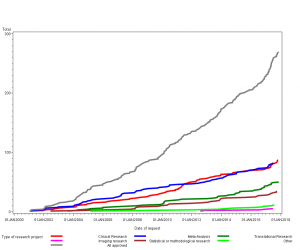Data sharing – a vital part of EORTC’s remit
7 May 2018
EORTC is committed to ensuring that the data generated from its studies be put to good use by the cancer research community and, whenever possible, are translated to deliver patient benefit. EORTC will share upon request from qualified scientific and medical researchers all data generated from its research whilst safeguarding intellectual property, the privacy of patients and confidentiality.
EORTC encourages the sharing of data, as it believes that it is vital for the proper functioning of the cancer research community in order to acquire greater knowledge of cancer to improve patient treatment. However, research in progress that can contribute to the completion of datasets must not be compromised by premature or opportunistic sharing and analysis of data, and thus EORTC will only release such information after the primary study results have been published.
EORTC’s data sharing policy was formally established in 2001. Between then and 2016 the number of requests for data increased from four to 44 per year, with an average of 20 per year from a total of 345 requests to date. Those applying for EORTC study data must submit the request and research proposal online via the EORTC portal. Requests must include the rationale for the proposed research and its objective; a description of the data elements being requested; the analysis plan; a publication plan; identification and roles of the proposed research team including a short CV of the statistician; and the source of funding, if any. When the research is conducted in close collaboration with EORTC Headquarters staff or EORTC members, co-authorship is claimed and the general publication policy of EORTC applies. Otherwise an acknowledgement to EORTC suffices.
Each request will be evaluated by EORTC for its scientific merit, the availability of the required data and the potential costs, and vis à vis of existing contractual agreements, patient consent and applicable legal requirements. The median review time is 8 weeks, and the Data Sharing Coordinator will grant the authorisation for release once all reviewers (legal, study coordinators, statistician, etc.) have approved the request. Datasets are distributed pseudo-anonymized as required by the data protection legislations.
To date, reasons to reject requests have been either a competing research project conducted by EORTC, that the requested data points were not collected in the study database, or the lack of methodological support to conduct the trial at the site of the applicant (no statistician). Data sharing use breaks down into % for meta-analyses, 13% shared with universities developing or testing new statistical methods, and 53% for the secondary use of the data in clinical research. In 32% of the latter category only clinical data are shared, 21% include biomarker results from bio-samples or images and are used for translational research, and the rest is shared between other types of research such as health technology assessment. Remarkably, no data request so far has been made with the intent of reproducing the original study results.
In pursuing its data sharing policy, EORTC concurs with the views of the World Health Organisation and the International Committee of Medical Journal Editors; both organisations state the trial data sharing is an ethical obligation.
All questions concerning EORTC data sharing should be addressed to DataSharing@eortc.be

Related News
Meet the new EORTC Board
9 Jul 2024
We are pleased to announce the release of the EORTC 2023 Annual Report
17 Jun 2024
Dr Denis Lacombe, EORTC CEO, appointed stakeholder co-chair of ACT EU advisory group
24 May 2024
Clinical Trials Day 2024: a Q&A on pragmatic clinical trials
20 May 2024
EORTC/EMA workshop suggests an international way forward for treatment optimisation studies
8 May 2024
EORTC’s Participation at the ESTRO Congress 2024
29 Apr 2024
EORTC: Advancing research and treatment for rare cancers
29 Feb 2024
EORTC Fellowship Programme: celebrating more than 20 years of impactful collaboration
22 Feb 2024
Appointment of Malte Peters as EORTC Strategic Alliance Officer
9 Feb 2024
Unique series of workshops in partnership with the European Medicines Agency (EMA)
7 Feb 2024


